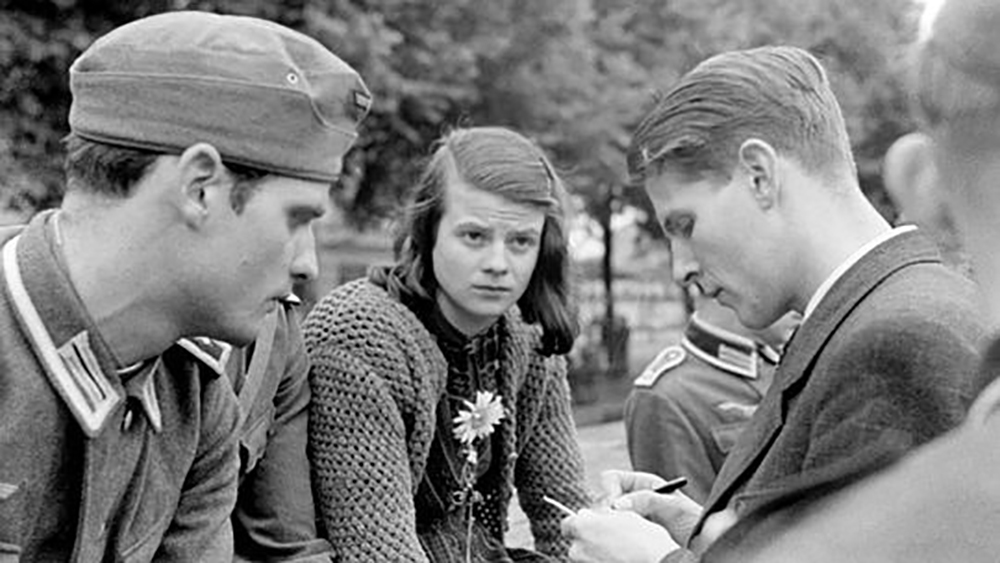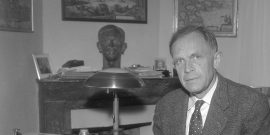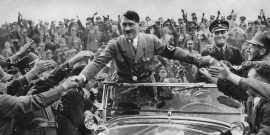Röpke looked for a liberalism purged of rationalist tendencies and infused with normative content reflecting Western civilization's accomplishments.
A Woman for All Seasons
There is a moment in Sophie Scholl: The Final Days, the 2005 German film of the student resistance hero’s final week, when her interrogator almost allows himself to waver. Their days-long battle of wits is the adaptation’s beating heart, as Scholl defiantly parries each thrust calculated to push her towards recanting. Though it’s an imaginative reconstruction from partial transcript records, it flows believably from what we know both of Scholl and of her interrogator—Police Inspector Robert Mohr, whose tone shifts moment to moment between bullying and paternal exasperation. He is an ideologue, but at the same time he is fascinated by Scholl in spite of himself. Her poise impresses him. Her conviction unsettles him.
Their clash peaks as Scholl insistently points to the Nazis’ dehumanization of Jews and the mentally ill. Mohr reflexively denies rumors of murder camps, but Scholl relates friends’ horror stories of a mental hospital full of children loaded in trucks for extermination, singing with anticipation because the nurses told them they were going to heaven. “Do you think I wasn’t raised right,” she demands, in tears, “because I have pity for them?” The camera lingers on Mohr’s face as she speaks. For a flash, we see the thinnest of cracks begin to open—in a slight crumpling of his lower lip, in a flicker of something deep behind his dead eyes. But the next moment, it’s gone. “These are unworthy lives,” he says, with a dismissive twitch of his hand. Scholl must understand that “a new age has dawned,” that nothing she says has to do with “reality.”
She concedes no such thing: “Of course it has to do with reality. With decency, morals and God.” At this, Mohr snaps. “Gott!” he spits out, jumping up from his seat. “Gott gibt es nicht!”—“God does not exist.”
Scholl would have turned a hundred years old on May 9th this year. On February 22nd, she was executed for high treason against the Nazi state, together with her brother and another comrade in their small resistance cell, the White Rose. The young people were alone in their resistance, publishing and distributing seven leaflets in total before the operation was smashed.
Scholl’s execution made her many times a martyr—a martyr of free speech, a martyr of conscience, a martyr of humanism. Though she was devoutly Christian, the secular man no less than the Christian could take her as a model, much like the freethinking playwright Robert Bolt took Thomas More as a model of authentic selfhood as he came to pen A Man For All Seasons. We might say of Scholl, as Bolt said of More in his personal preface to the play, that here was a woman with an adamantine sense of her own self.
Scholl’s spirit pulsates through the flurry of letters and journal scraps she left behind (published by Plough and sampled here), including many poignant letters to her boyfriend Fritz on the Russian front—letters which become more pleadingly impassioned as she begs him to think for himself, to resist his training and hold onto his humanity. They offer a glimpse into a mind and heart that seemed to be in perpetual motion, as do the writings of her brother and partner in resistance, Hans. (So united were they that they are commemorated together as “Geschwister-Scholl” in the Munich Platz that bears their name today.) A given day might find her swimming a river, skiing a mountain, or minding ten children morning to night before spending bedtime with Augustine (or, if she’s vacationing with family, staying up late to argue with Hans over Leibniz’s conception of divine volition). To these and to all things, she gave her undivided attention, her undivided self.
In her boundless appetite for beauty, she overlooked nothing, took nothing for granted—mountain peaks tipped pink in sunset, wispy clouds that floated “like the slender white feathers of some strange bird,” clumps of trees so lovely in evening light that she had to walk backwards “to prolong the sight of them.” (From that entry, she recalls two particular fir trees shaken and colliding in strong autumn wind, until the weaker had to “pay the supreme penalty.”) She often picked wildflowers, recording and delighting over their distinct beauties, as she delighted over each tiny “distinct individual” in her care as a kindergarten teacher. In her letters she refers tenderly to both flowers and children as “the little things.” She writes of one toddler who developed a “crush” on her, demanding she tuck him in every night, murmuring, “You’ll stay forever, won’t you?”
And yet, mingled with her buoyancy, stubbornness and keen intelligence, her private writings also reveal a fragility, a vulnerability that manifests itself most purely in her devout Christian faith. This too is caught in the film dramatization, as she clasps her hands and sends her timid pleas heavenward—not that she would escape, but that she would know God more. “Whenever I pray,” she wrote in her journal, “the words drain out of me. The only ones I can remember are ‘Help me!’ I can’t offer up any other prayer for the simple reason that I’m still far too abject to be able to pray. So I pray to learn how to pray.” She writes of her longing to forge an instant “path to God” by sheer force of desire, only to recognize that the road is long, a journey of “many tiny little steps.” After a period of “backsliding,” she resolved “not to ask anything more of God” until she “could enter His presence again.” Yet, “That in itself was a fundamental yearning for God. But I can always ask him, I know that now.”
As a Lutheran, Scholl has never been a candidate for canonization, a prospect which would surely have appalled her. She confessed to feeling far from saintly as she wrangled her small charges, managing their numerous little wickednesses and “stupidities.” She felt even less so while enduring the endless chatter and loud tics of her roommate, whose proximity gave her “almost physical pain.” But perhaps, she wrote, it was doing her soul good. Dostoevsky’s insight on the danger of loving humanity while failing to love “man in particular” comes to mind: “In my dreams, I often make plans for the service of humanity…Yet I am incapable of living in the same room with anyone for two days together.” By the following month, Scholl writes that she is softening towards the children, at least. “[M]y impulse to help the helpless little things is gradually overcoming my personal antipathies. (I wish I could say as much of my attitude to everyone or almost everyone else.)”
It was the self-appointed task of the White Rose to remind the secular society, and the Christians deferring to it, whence their humanity came. It was their task to ensure that while the German people might honestly say they did not act, they could not say that they did not know.
Her fellows in the White Rose were a mix of Protestant and Catholic, all single-mindedly focused on the cause that bound them together. Their anti-propaganda leaflets were not confined to secular humanist arguments but carried the intuition of humanism to its sharp Christian point, even challenging those readers who already considered themselves Christian. Sophie in a letter to Fritz castigates “self-styled Christians” who defer to ambivalence merely “because we’ve been born into a world of contradictions.” In passages like this, from Leaflet 4, the students attempt to rouse the slumbering:
I ask you, you as a Christian wrestling for the preservation of your greatest treasure, whether you hesitate, whether you incline toward intrigue, calculation, or procrastination in the hope that someone else will raise his arm in your defence? Has God not given you the strength, the will to fight? We must attack evil where it is strongest, and it is strongest in the power of Hitler.
The leaflet concludes, “We are your bad conscience! The White Rose will not leave you in peace!”
But as David Berlinski once wrote, what Hitler did not believe, like Stalin, like Mao, like every minion who lent credence to their causes, was that God was watching them. That was “the meaning of a secular society,” after all. It was the self-appointed task of the White Rose to remind the secular society, and the Christians deferring to it, whence their humanity came. It was their task to ensure that while the German people might honestly say they did not act, they could not say that they did not know.
Our sole primary record of Scholl’s final thoughts is a letter to her parents from her cellmate, Else Gebel. Gebel recalls waking her on the morning of her execution. Serenely, Scholl said she had dreamt that she was carrying a child in a white baptismal dress up a steep mountain pathway. Suddenly, a chasm opened up at her feet, threatening to engulf them. She had just enough time to toss the child safely to the other side before falling into the abyss herself. The child, she explained, smiling, “is our idea.” And the idea, she was sure, would prevail.
Inspector Mohr would later write in a report to Sophie’s father that he had attempted to save her life by persuading her to renounce all ties to her brother and the rest of the White Rose. But she had insisted that if Hans was to be executed, she must join him. She was no less guilty.
At 4:30 PM, Gebels writes, Inspector Mohr came through the door, wearing a hat and coat, “pale as chalk.” Gebels asked him if it was true that the siblings would be executed that day, along with their Catholic friend Christoph Probst, a medical student and father of three. Mohr nodded silently. “How did she take the verdict?” Gebels asked. “Did you speak to her?” Mohr’s voice was weary as he replied, “She was very brave.” Was there no prospect for clemency? Mohr said nothing for a moment as he looked at the clock on the wall. Then, without affect, he said, “Think of her in half an hour.”
After the execution, we know little of Mohr’s life, except that he became chief of the Gestapo office in Mulhouse and that though briefly interned by the French after the war, he was never tried for his service. He later worked at a spa at Bad Dürkheim and died in 1977.
One wonders how his final days were spent. One wonders what thoughts came to him, what images, what dreams. Was he hardened? Was he guilt-ridden? Was he never left in peace, even to the end?
In a letter to Fritz dated October 28, 1942, Sophie urges him to read Romans 8. “Read the wonderful words at the beginning,” she insists. “For the law of the Spirit of life in Christ Jesus hath made me free from the law of sin and death.” Aren’t they “terribly, terribly poor,” she reflects, “the people who neither know nor believe that? Their poverty ought to make us eternally patient with them (that, and the knowledge of our own weakness, for what would we amount to by ourselves?), even if their stupid arrogance tends to infuriate us.”
Perhaps, even as she looked her own accuser in the eye, Scholl was moved with the same compassion she expresses here. The work that was man, even in his most stupidly arrogant manifestation, prompted her to reflect in her journal, “When I look at the people around me, and also at myself, I feel awed by humanity because God came down to earth for its sake. On the other hand, this is what always strikes me as most incomprehensible. Yes, what I understand least about God is his love. But what if I didn’t know about it!”
This was Sophie Scholl. Like Thomas More, in Robert Bolt’s words, “a person who could not be accused of any incapacity for life, who indeed seized life in great variety and almost greedy quantities,” yet found something in herself “without which life was valueless,” and, denied life, willingly grasped death. In her last steps to the block, she was collected. In her last seconds as her head was adjusted for the guillotine, she was calm. For in those seconds, she had attained Eliot’s “condition of complete simplicity/(Costing not less than everything).” Her eyes were fixed towards that place where there is no more death, towards that time when there will be no more sorrow, when all manner of things shall be well, when the tongues of flame are in-folded, and the fire and the rose are one.



